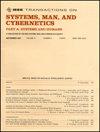Adaptive Finite-Time Saturated Tracking Control for a Class of Partially Known Robots
IEEE Transactions on Systems Man and Cybernetics Part A-Systems and Humans
Pub Date : 2021-09-01
DOI:10.1109/TSMC.2019.2957183
引用次数: 15
Abstract
Only partial system knowledge for the generalized robotic dynamics with input saturation, i.e., the regression matrix for the specific robot, is required to design the proposed adaptive finite-time saturated tracking control (AFTSTC). It contains a nonlinear auxiliary tracking error, which can shape the system frequency response. As the operating point is in the neighborhood of the zero auxiliary tracking error, nonlinear filtering gains can be increased to accelerate its tracking ability. Moreover, the traditional skew-symmetric matrix’s condition for the time derivative of inertia matrix and the Coriolis and centrifugal force matrix is not necessarily required such that the uncertainties and the finite-time convergence are reduced. The computational complexity as compared with the fuzzy neural network adaptive control is also addressed. The stability of the closed-loop system is verified by the Lyapunov stability theory. Finally, two practical robotic examples are given to validate the effectiveness and robustness of the proposed control.一类部分已知机器人的自适应有限时间饱和跟踪控制
设计所提出的自适应有限时间饱和跟踪控制(AFTSTC)只需要具有输入饱和广义机器人动力学的部分系统知识,即特定机器人的回归矩阵。它包含一个非线性的辅助跟踪误差,它会影响系统的频率响应。由于工作点在辅助跟踪误差为零的邻域内,可以增大非线性滤波增益,加快其跟踪能力。此外,对于惯性矩阵的时间导数和科里奥利力和离心力矩阵,不需要传统的偏对称矩阵的条件,从而减少了不确定性和有限时间收敛性。讨论了与模糊神经网络自适应控制相比的计算复杂度。利用李雅普诺夫稳定性理论验证了闭环系统的稳定性。最后,给出了两个实际机器人实例,验证了所提控制的有效性和鲁棒性。
本文章由计算机程序翻译,如有差异,请以英文原文为准。
求助全文
约1分钟内获得全文
求助全文
来源期刊
自引率
0.00%
发文量
1
审稿时长
6.0 months
期刊介绍:
The scope of the IEEE Transactions on Systems, Man, and Cybernetics: Systems includes the fields of systems engineering. It includes issue formulation, analysis and modeling, decision making, and issue interpretation for any of the systems engineering lifecycle phases associated with the definition, development, and deployment of large systems. In addition, it includes systems management, systems engineering processes, and a variety of systems engineering methods such as optimization, modeling and simulation.

 求助内容:
求助内容: 应助结果提醒方式:
应助结果提醒方式:


